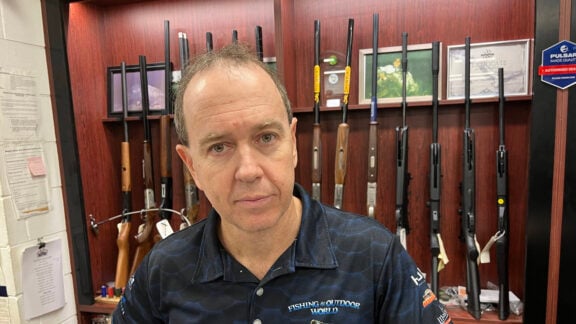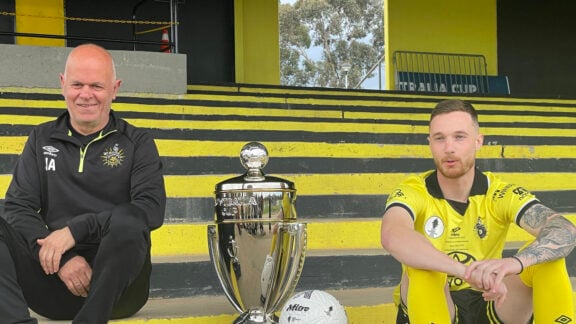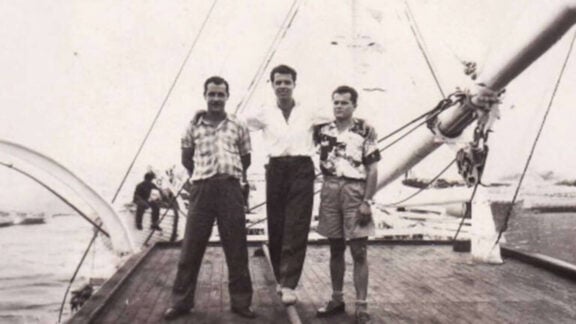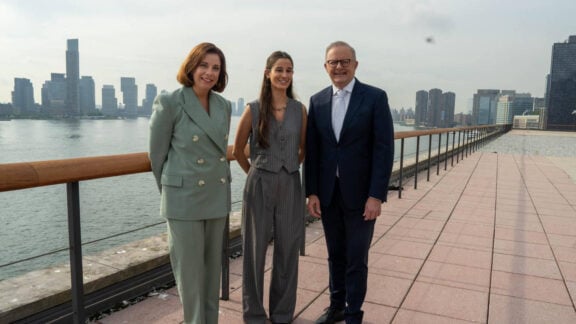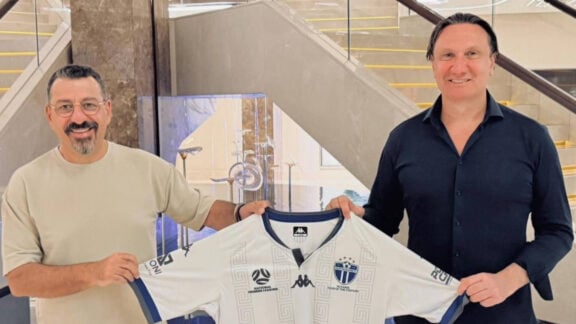Nick Andrianakos was born in November 1943, in Pikerni, a small picturesque village in Arcadia built on the slope of Mount Lyrkia. Its residents are involved agriculture, viticulture and livestock breeding.
Nick was raised in a very close knit family environment with his brothers Alexandros and Yianni. His parents Apostolos and Vasiliki encouraged them from very early on to become independent and progressive. From the age of 13 Nick’s inclination in trade in particular, is apparent. “I would rent a bike and on the rack I placed garlic braids which I sold in Argos, Nafplio, Corinth and Kalamata. I would buy sheep and resell them instantly. I was honest in my transactions and inspired trust”, he says as he nostalgically travels back in time.

Exodus
A turning point in his life was the moment he was discharged from the Hellenic Military Force in Cyprus
(ELDYK) on New Year’s Eve in 1966 when he realised that his village had been abandoned: “Most of the young people had already fled and those who were left were preparing to migrate. All I knew is that I didn’t want to become a farmer. I was one of the very last to leave, as a matter of fact.
Upon making this huge decision, I had promised myself that I would return in 2 – 3 years at the most. I knew exactly how much I needed and how I would appropriate the money. My goal was to purchase a bus which cost 100,000 drachmas in those days”.
He smiles and his face is illuminated by the fond memories of forty seven years. “I was the first to disembark the ocean liner PATRIS at Melbourne’s Station Pier and the very next day I went looking for work at General Motors. I remember wearing a suit and tie on my first day, not knowing what to expect.
The work was difficult, repetitive and mundane but my psychology and morale stayed positive and energised. I knew and always reminded myself that this was only a temporary situation which would bring me closer to the day of my return to Greece”. Amongst his many pursuits during this time, he worked in a leather factory for six months until he decided to become a crane operator for three and a half years and see the city from… up above.

His life companion
In his second year of residency in Australia, he bought a house. His life companion had already been living in Melbourne two years before him: “I was informally engaged with Anthoula and we maintained correspondence. Out of all the women in the village, I must admit, she was my mother’s favourite. We married and my life acquired true meaning. Our happiness was complete with the birth of our four children, Paul, Vasiliki, Theo and Christina”.
What happened to the plans of repatriation?
“Well, one must not think I had abandoned them thoughtlessly. I went back in 1975 to explore the possibilities and to determine whether I could return and fulfil my original plans. Things had changed so much. Nothing had remained the same. Money had lost its value and I can say with certainty that this was the main reason I decided to pursue something of my own in Australia. With the little money I had, I bought the first petrol station in Coburg which I still own today”. It is one of the many links in the chain all over Melbourne which constitute his company, MILEMAKER PETROLEUM.

I didn’t worship money
Where does he attribute his huge professional success?
“I believe I made the right choices and was genuine and honest in my dealings with people. I never did anyone an injustice and always put the person first. I don’t worship nor have I ever worshipped money. I also believe that people should give back to society. I have a particular interest in education. Personally, I never had the opportunity to further my education due to the circumstances and therefore I would like to give the opportunity to Greek-Australian children as well as children of other ethnic backgrounds to learn Greek”.
His donation of $300,000 to Alphington Grammar and his charitable contribution towards the construction of the Cultural Centre are merely two examples amongst many that speak truly of Nick Andrianakos generous and benevolent spirit.

Alphington Grammar keeps the Greek language, the culture and traditions alive and also transfers these values to children of non Greek background. The multipurpose hall (Andrianakos Centre) adds greater value to the school. For many years, this project had been part of his plans but had yet to be materialised.
Very eloquently he expresses the views of many Greek-Australians who place great importance and value in the maintenance of language and cultural inheritance: “I believe we have an obligation to give the younger generations what we didn’t have. At a time when Greece was being abandoned by the youth and thousands were fleeing because their birthplace could not provide them with the basic opportunities to become educated and prosper, they promised themselves that they would do everything in their power so that their children would not share the same fate. Surely, it is not a coincidence that our community is blessed with many scientists and successful young individuals in managerial positions in the business, private and public sectors. This instils within us a sense of pride and satisfaction that our efforts were not in vain”.

A cause for everyone
Maintenance of Greek consciousness in the younger generations is a topic of particular concern for Nick Andrianakos. “With the third and fourth generation amongst us and our grandchildren at school, perhaps it is time to move more decisively so that our language can be preserved and our cultural heritage remains unaltered. I congratulate those who have dedicated their time to this cause. The efforts of many people were required for the acquisition, existence and upgrade of Alphington Grammar, for example. Therefore, we must not forget the contribution of S. Papassavas and G. Fountas. Ultimately, like many others, they lead the way for new followers. We have a duty to recognise this”. We come to the construction of the Community Cultural Centre.
“It is truly an accomplishment which sees the vision of so many people become a reality. It should be supported by the entire community so that each and every one of us can feel a sense of belonging there. The Community Cultural Centre needs to be embraced by all community entities as a means to represent the Greek-Australian people and mainly to attract the younger generations. I need to stress that it’s not enough to simply build a beautiful building. The Greek heartbeat must be alive and ticking inside its perimeter in order to attract all generations and express the true meaning of Greeks in Melbourne. We must remember that Lonsdale Street was the heartbeat of the Greek community a few years ago. I don’t see why this can’t happen again under a different framework. I cannot stress enough that we must take ownership of this project and use it to uplift and elevate the Greek name in the eyes of the wider Australian community”.

Strength in unity
In relation to the community organisations, Nick Andrianakos, along with many others, believes that strength is found within unity. “Times have changed and people have undergone changes too. We cannot possibly have so many organisations, the majority of which are not in a position to survive. The older generation insist on being present, regardless of the fallen numbers and refuse to give the youth a chance. Some organisations however have done exactly that and are prospering as a result.
It must be done on a larger scale so that there can be a continuation. The ideal solution would be to decide on the establishment of a representative organisation from each geographic prefecture of Greece, for example, one from the Peloponnese, one from Macedonia, the Aegean islands and so on. We are talking about a situation that would require drastic changes in the way we think and how we deal with constantly changing circumstances. The younger generations may perhaps attempt this. It would be a wish fulfilled”.
In relation to the crisis in Greece today, he states that “there will be difficult times for many people and for long periods ahead, but the economy will reflate. Greece has encountered worse and did not abandon the struggle. Of course significant changes need to happen, particularly in the mentality of Greek citizens and the government. In my opinion they will change, most likely, given the pressures they are facing. Besides they have no other choice”. While his children are also at the forefront of the colossal enterprise he created, he continues to hold the wheel. Due to his intelligence and the basic principle he adheres to that “work benefits health” he is where he is today. At the top of a dynasty he built with his own two hands.

The feature was initially published in Vivienne Morris’s 2016 book ‘Portraits of Hellenes the Antipodes’ – The Story of Those Who Enriched Australia Volume II.
Before you go, don’t forget to share your thoughts with us by completing our reader survey – your feedback helps us continue to improve and bring you the content you love.




